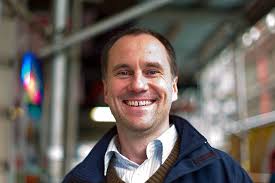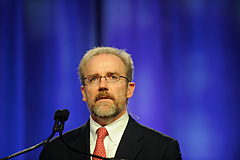 Hi, happy Friday, readers. StrictlyVC was working on some stories for next week so no column this morning, but see you back here on Monday. Hope you have a stellar weekend!
Hi, happy Friday, readers. StrictlyVC was working on some stories for next week so no column this morning, but see you back here on Monday. Hope you have a stellar weekend!
—–
Top News in the A.M.
The Mac turns 30 today.
New Fundings
The Cambridge Satchel Company, a five-year-old, Leicestershire, England-based luxury leather bag company, has raised $21 million from Index Ventures to hone its digital platform and expand overseas across the U.S. and China. It appears to be the company’s first institutional capital.
Fitmob, a seven-month-old, San Francisco-based fitness startup whose classes are based around trainers rather than around gyms, has raised $9.75 million in equity and debt from Mayfield Fund, Silicon Valley Bank, and individual investors, reports GigaOm. The company was cofounded byPaul Twohey, who previously cofounded Ness Computing and worked as an early engineer at Palantir Technologies, and Raj Kapoor, who cofounded Snapfish and worked until 2012 as a managing director at Mayfield Fund.
iProf Learning Solutions India, a four-year-old, Noida, India-based maker of an education tablet that stores reading material, video, and audio lectures, has raised $9 million in Series B funding from DMGI and earlier investors Norwest Venture Partners and IDG Ventures. The company has raised about $15 million altogether, including from the test prep giant company Kaplan.
Jelly, a months-old, San Francisco-based question-and-answer service that’s driven by images, has raised an undisclosed amount of Series B funding led by Greylock Partners, with Spark Capital participating. The round comes less than a year after Jelly — founded by Twitter co-founderBiz Stone — raised its Series A round from Spark, Greylock, and Twitter cofounder Jack Dorsey. (That amount was also kept under wraps, though TechCrunch sources suggest it was in the single-digit millions.)
Luxexcel, a four-year-old, Goes, Netherlands-based company that uses 3D printing to produce optics and lenses, has secured “several million Euros’ worth” of funding from three international venture capital funds, says the company. Its backers include Munich Venture Partners,ChrysalixSET and Filsa Capital.
QFPay, a three-year-old, Beijing-based maker of a Square-like device for facilitating e-payments via smartphones, has raised $16.5 million in Series B funding from an undisclosed source. As Tech in Asia hints, Sequoia Capial — which led QFPay’s undisclosed amount of Series A funding last year — seems like one likely candidate.
Quantum Health, 13-year-old, Columbus, Oh-based service and care management platform for employer health plans, has raised an undisclosed amount of funding, including from GE Ventures and Altaris Capital Partners.
VisibleBrands, a five-year-old, Kirkland, Wa.-based company behind an in-store digital couponing platform, has raised $2.3 million in Series B funding from previous investors, says the company. The company has raised $11.2 million altogether, according to Crunchbase, all from undisclosed sources.
New Funds
Founders Fund, the 8.5-year-old, San Francisco-based venture firm started by early Facebook investor Peter Thiel, is raising about $750 million for its fifth fund, reports Bloomberg, which obtained materials meant for prospective investors. At that size, the fund would be 20 percent larger than the firm’s last pool of capital. Privately held Palantir Technologies, now valued at $9 billion, and Yammer, sold to Microsoft in 2012, are just two of Founders Fund’s high-profile investments.
IDG Ventures India is reportedly looking to raise $162 million for its second fund. Whether it’s as easy to raise as its first fund is an open question. Unlike that first fund, a 2007 vehicle that attracted most of its capital from global investors, including the media company International Data Group — the venture firm intends to target wealthy Indians this time around, reports the Economic Times. More here.
Kaszek Ventures, a 2.5-year-old, Montevideo, Uruguay-based venture firm focused on Latin American startups, has raised $135 million for a second fund, shows a series of filings first flagged by peHUB. The firm’s first, $56.4 million, fund was raised in 2011.
The Toronto-based fund of funds manager Northleaf Capital Partnerssuddenly has a lot more money to invest in venture funds that support early- and mid-stage Canadian businesses. More here.
Singularity University, the Silicon Valley think tank, has unveiled plans to raise a $50 million fund. (StrictlyVC first told you about this effort in early October.) According to GigaOm, fundraising for the vehicle will get underway during the second quarter of this year; the money will be used to back startups launched by Singularity University students, alumni, and teachers. Here are more details.
—–
IPOs
Care.com, the 7.5-year-old, Boston-based, venture-backed online caregiver marketplace, is raising about $91 million in its IPO, topping its previously projected price. Xconomy has much more about it.
Just Eat, a 13-year-old, London-based company that manages an online food ordering platform, is eyeing an IPO this spring that would value the company at up to $1.5 billion, reports the International Business Times. The company’s valuation is 70 to 90 times Just Eat’s projected pre-tax earnings for 2013, according to the Financial Times. The has raised roughly $130 million from investors, including Index Ventures, Greylock Partners, Redpoint Ventures, SM Trust, Venrex Investment Management, and Vitruvian Partners. It boasts 5.5 million active users.
—–
Exits
Userfox, a two-year-old, San Francisco-based startup that helps companies retain their users via email, including through newsletter management, has been acquired by AdRoll, the online ad retargeting company. The acquisition is AdRoll’s second after Bitdeli, acquired in June of last year. Userfox had raised a modest amount of angel funding from Y Combinator, 500 Startups, and Point Nine Capital.
—–
People
Marc Andreessen took to Twitter yesterday to dash any hopes that PayPal might be spun off from eBay, a move that activist investor Carl Icahn had proposed. Andreessen, an eBay director, wrote: “Entire eBay board, including me, fully aligned that eBay + PayPal are best together.”
Thorsten Claus has joined Next World Capital as a principal based in San Francisco. Claus joins the firm from T-Venture, the venture arm of Deutsche Telekom Group, where he was a senior investment manager. Some of his past investments include (now public) Demandware, Ubiquisys (acquired by Cisco), and Jawbone, the privately held wearable technology and audio device company.
Eric Wolford, who recently served as the president of the products group of software optimization company Riverbed Technology, has joined Accel Partners as a venture partner. Wolford currently sits on the board of directors for BitTorrent and Jut, both Accel companies.
—–
Happenings
If you’re in New York early next week, you might want to check out a Bitcoin discussion taking place at the offices of venture firm Union Square Ventures. The event — which is open to the public but limited in size due to space constraints — will feature five speakers, including: Seetha Ramachandran, the deputy chief of the asset forfeiture and money laundering section at the U.S. Department of Justice; Coinbase co-founder Fred Ehrsam; Jeremy Allaire, founder of the digital currency company Circle; Albert Wenger, a managing director at Union Square Ventures; and Margo Tank, a partner at Bucky Sandler, a law firm that specialises in anti-money laundering and information security cases.
—–
Job Listings
The D.E. Shaw Group is looking for a corporate development associate in New York. The job entails proposing, researching, and executing new business ideas; applicants should have at least two years of experience in management consulting, venture capital, i-banking, PE, or at a startup.
—–
Data
A rising tide lifts all boats: CB Insights publishes its chart of the day, showing that corporate VCs are benefiting from a wave of tech IPOs, right alongside their traditional, independent peers.
—–
Essential Reads
How celebrated Silicon Valley CEOs conspired to drive down 100,000 tech engineers’ wages.
The U.S. prison system is already packed with minor drug offenders; let’s not make the same mistake with hackers, argues former public defender Hani Fakhoury in an excellent essay in Wired.
—–
Detours
These 25 high schools boast the highest standardized test scores in the the U.S.
Former CIA spy Valerie Plame thinks “Homeland” “jumped the shark this season.”
We can all laugh about the “Super Doobie Bowl,” but there’s nothing funny about pot’s effect on teenagers, say Northwestern University professors.
A photo series you’ll want to get behind. (We had to lighten things up after that last item.)
—–
Retail Therapy
We love these fashionable eyeglasses for kids. (Is anyone doing this in the U.S.?)
A Polaroid to help you cut the cheese. (No, really.)
—–
To sign up for StrictlyVC, click here. To advertise, click here.




